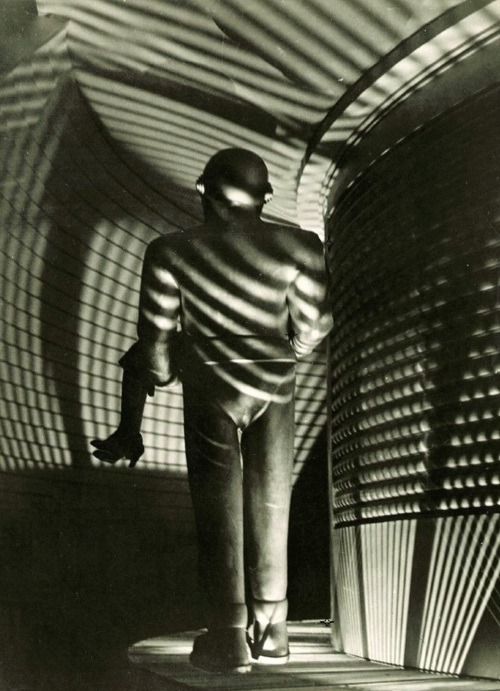In
my previous Best Movie blog
entries, I've mentioned scenes that I believe to be the heart of
those films, the essential expression of their nature. In La
Belle et La Bete, it's the scene
where Belle and the Beast walk together in the garden for the first
time. In Bad Day At Black Rock,
it's the scene where Macreedy delivers a karate chop to Trimble, proving that
one-armed war veterans should not be underestimated by small-town
thugs.
In
The Day The Earth Stood Still,
it's the scene where Klaatu signals Gort with the flashlight, then
enters his spaceship, while Bernard Herrmann's incomparable score
plays in the background (a segment called Nocturne/The Flashlight/The Robot/Space Control). With no dialog, it
manages to convey a supreme sense of wonder as we're invited into
that alien ship to glimpse the Unfathomable.
Like
Rear Window, The
Day The Earth Stood Still has no
wasted scenes, every frame counts. The difference is that the score
forThe Day The Earth Stood Still is
an integral part of the movie – it's essential to help tell the
story. Movies like this are one of the reasons music videos
eventually became so popular – images and sounds, when combined,
are powerful storytellers.
In
a way, it's surprising this movie ever got made. It's based on a
classic science fiction story, “Farewell To The Master,” (Harry Bates, 1940) which has a very different
plot. Only the basic premise of an alien visitation remains the
same, and the fact that there's a robot. These are nerdy elements,
and in those days they were usually relegated to the realm of the B
movie. YetThe Day The Earth Stood Still was made by an
A-list director, Robert Wise – which is why it also earned an A-list
composer for the score, and an excellent cast and script (Edmund H. North).
Many
people have seen a parallel to the storyline of the film and the
Jesus parable, with Klaatu as the Messiah. At one point, he is
killed and resurrected. But though Klaatu is ethical and wise beyond
Human standards, his message is not one of joy and peace. Basically
he's on Earth to tell us, Look, you're a bunch of destructive
yahoos. If you're so petty and foolish that you have to keep killing
each other, that's your business. But if you bring your conflicts
out into space, we'll blast you into oblivion. The choice is yours.
He
doesn't deliver that ultimatum until the very end of the movie – up
until that point, most of the humans he encounters spend their time
proving that his lack of faith in us is utterly justified. People
react fearfully, and the government fails to approach Klaatu with
diplomacy (they opt for the Scorched Earth approach). A few of the
people he meets manage to win him over. You never get the impression
that he hates us, just that he's disappointed that we can't grow up
and get a clue. Heck, I'm disappointed by that, too. Being a member
of the Human Race is like having a cousin who's a great guy –
unless he's drinking.
Both
Michael Rennie and Patricia Neal give their characters extraordinary depth. They come from a time when “The Theater”
included plays acted on stage. In the early days of Hollywood,
casting directors recruited heavily from a stable of extremely well-
trained and talented character actors from that earlier tradition.
This is one of the things that puts the Day The Earth Stood Still
in a category above many of the Science fiction B films of that
era (fun and imaginative though they could be).
The
special effects are fairly minimal – just some minor animation when
Gort disintegrates guns and tanks (also a soldier or two when the
going gets tough). Everything else is camera angle, lighting, great
editing, perfect music. I'll take these old-fashioned psychological
effects over CGI any day.
Beyond
the fact that it's a great Science Fiction movie,The Day
The Earth Stood Still has a
personal dimension for me. The first time I saw it, I was about
eight years old, and my father didn't live with us. He and my mother
had divorced a few years before, but I didn't know that. He served
in the air force, and the Viet Nam war was still going on. I knew my
father was deployed there, so I assumed he wasn't home because he was
fighting in that war. I was only half right.
In
the movie, Klaatu befriends a boy. His behavior toward that boy is
fatherly, and I've always sensed a bit of romance between Klaatu and
Patricia Neal's character. When I saw Klaatu get into his ship at
the end of the movie and fly away, leaving the woman and her boy
behind, it broke my heart. It still does, every time I see it.







No comments:
Post a Comment